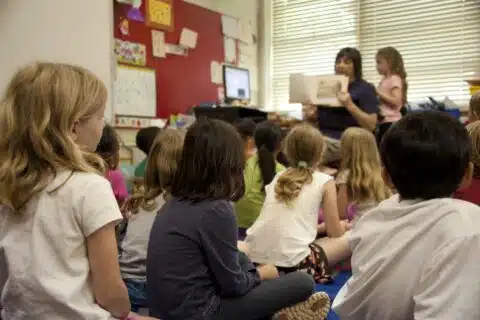How does the French schooling system work? In this blog post, we will explain how the French education system works, helping you better understand this topic.
In France:
- school attendance is mandatory from the ages of 3 to 16 years old.
- the year of your child’s birth determines when they start school.
- academic years start in September and finish in July until the end of collège, the equivalent of high school in the UK, middle school in the US.
- for higher education, the finishing time depends on the level and type of studies, and it varies between May and the end of June.
La crèche
La crèche is essentially a daycare option for working parents that have children between less than a year to 2 or 3 years old. There are several options for daycare. The most common is la crèche collective (collective daycare), which usually follows the working hours. Another option is to use the services of a assistante maternelle who keeps a small group of children at their house. This option is more expensive but provides more personalized care for the child and offers greater flexibility. Finally, the halte-garderie is only available for a few hours.
La maternelle
La maternelle (Kindergarten) usually starts around 3 years old and lasts until 5 years old. During this time, your child will mostly learn to socialize with others, practice creative and logic skills and sometimes participate in singing or theatre sessions with older children. Maternelles are often attached to an école primaire.
L’école primaire
Regarding l’école primaire (primary school), it lasts usually from 6 years old until 11 years old. During this time, children learn how to read and write as well as starting to learn some history, geography, arithmetic and sometimes a second language. At this level, classes are on average 20 students.
Le secondaire (secondary school)
Le collège
Le collège (middle school/high school in the UK) lasts 4 years. The years are respectively known as follow:
- Year 1: sixième (6th)
- Year 2: cinquième (5th)
- Year 3: quatrième (4th)
- Year 4: troisième (3rd)
At the end of the third year, students take an exam called Le Brevet des Collèges.
The following subjects are typically tested:
- French language and literature (Langue française et littérature)
- Mathematics (Mathématiques)
- History-Geography and Civic Education (Histoire-Géographie et Éducation civique)
- Sciences: Physics, Chemistry and Life & Earth Sciences (Physique-Chimie et Sciences Vie et Terres or SVT)
- Foreign language (Langue vivante étrangère) – Usually English or German but it can be another foreign language.
Depending on the school, there might be an oral examination as well, which could be in any of the subjects mentioned above or on a specific project.
Le lycée
Le lycée (highschool) is completed in 3 years and each year is named as follow:
- Seconde (2nd)
- Première (1st)
- Terminale (Ending year)
In Seconde, the students continue their education and have to make a choice about their specialization for the years after. In the last 2 years, the student has to choose a certain number of specialties and optional courses.
At the end of the Terminale, the Baccalauréat exam is taken and will determine if the student can pursue higher education. The grades of the year and this exam are important as the better the grades, the better the chances are to get accepted in specific schools.
Le supérieur (higher education)
In higher education, there are plenty of choices, and students need to apply to each program through a dedicated platform called ‘Parcoursup’ for university. Applicants need to explain why they want to enter the program both orally and in writing, and share their grades.
If applying to a program that is outside of their school’s catchment area, students will not be prioritized. This means that it’s harder to get into programs that are far from their previous highschool’s zone.
The degrees have been harmonized on a European level and work with the LMD system. This stands for:
- Licence: We often call it Bac+3, which literally means 3 years after the Baccalauréat.
- Master: Bac+5, the 2 years after the Licence.
- Doctorat: the next 3 years after the Master. This is to work on a specific research project and write a thesis about it.
Then, you have multiple types of school choices. The main ones are:
l’Université (university)
This is the most common choice as it is a public school, which means it is the most affordable (between 170€ and 243€ of school fees yearly). Moreover, the program choice is quite important. However, universities tend to have less internships than others but this really depends on the university and the program.
It is important to note that health studies (nursing, medicine etc) are also part of university but have a special status as the courses and selection process is quite different. Their cost varies from 170€ to 1,316€. Let’s not forget that health studies are among the longest as they can last up to 12 years after the Baccalauréat depending on the specialization chosen!
Grande école de commerce (business school)
Business schools are a different story as they are private schools only (not state owned). Their prices usually vary between 7,000€ and 10,000€ on average. However, the learning methods are quite different and based on a practical approach. Classes are smaller than at university with around 30 students per class. Internships play an important role in the program and doing one every year is mandatory, something which is not the case in Licence years.
You can enter a business school in two ways: after the Baccalauréat or after a prépa (prep school), which lasts two years after the Baccalauréat, by taking a concours (entrance test).
Grande école d’ingénieur (engineering school)
In order to enter this type of school you need to take a preparatory program of 2 years. Then you take an exam and you choose which schools you want to apply to. Your score will determine the chances you have to be taken depending on the school ranking. Top ranked engineering schools are the most selective schools. The cost is usually 2,500€ per year on average.
Useful Links
Understanding the school system in France (to go further): https://www.hsbc.fr/en-fr/a-vos-cotes/s-installer-en-france/comment-fonctionne-le-systeme-educatif-francais/
https://fulbright-france.org/en/study-france/understanding-french-education-system
https://eduscol.education.fr/2861/school-education-france
https://eduscol.education.fr/2861/school-education-france
You might also be interested in…
All articles by: Leslie Belliot






